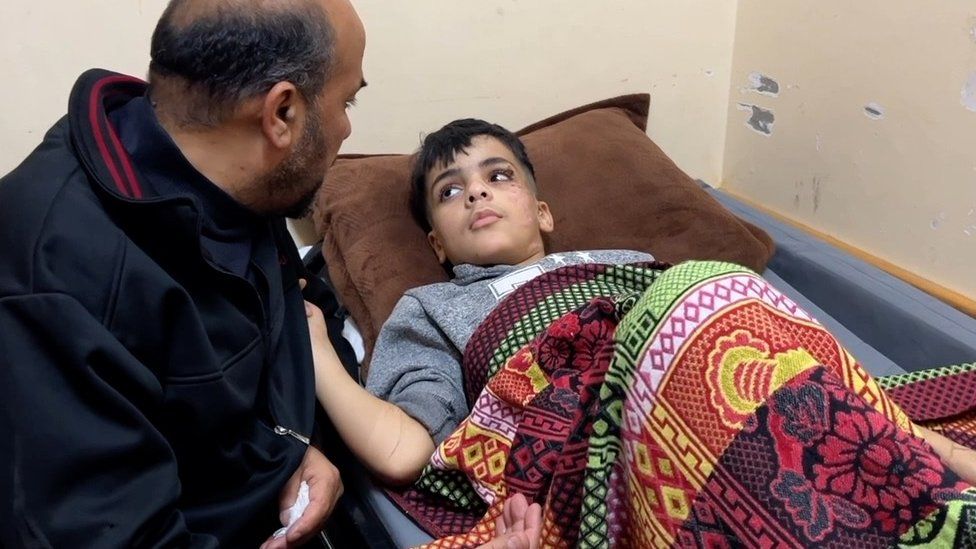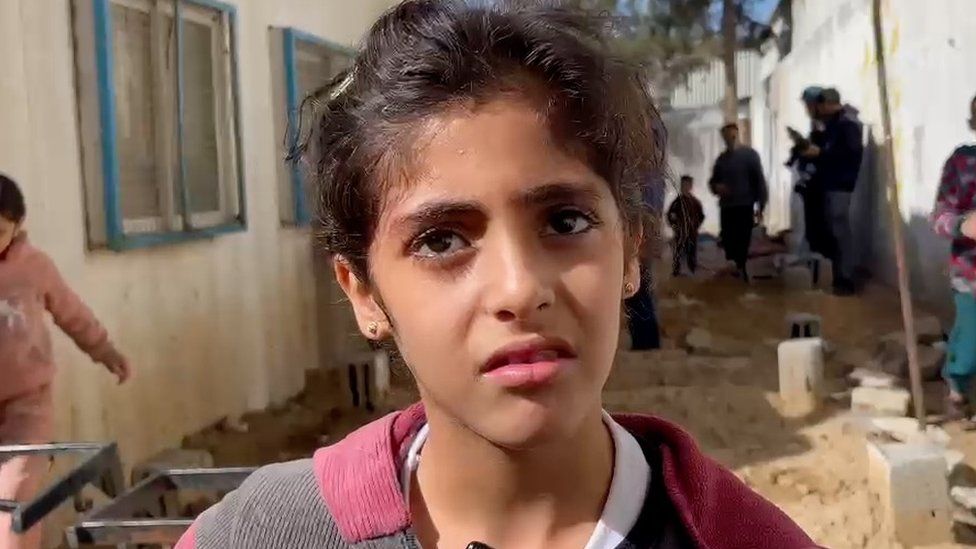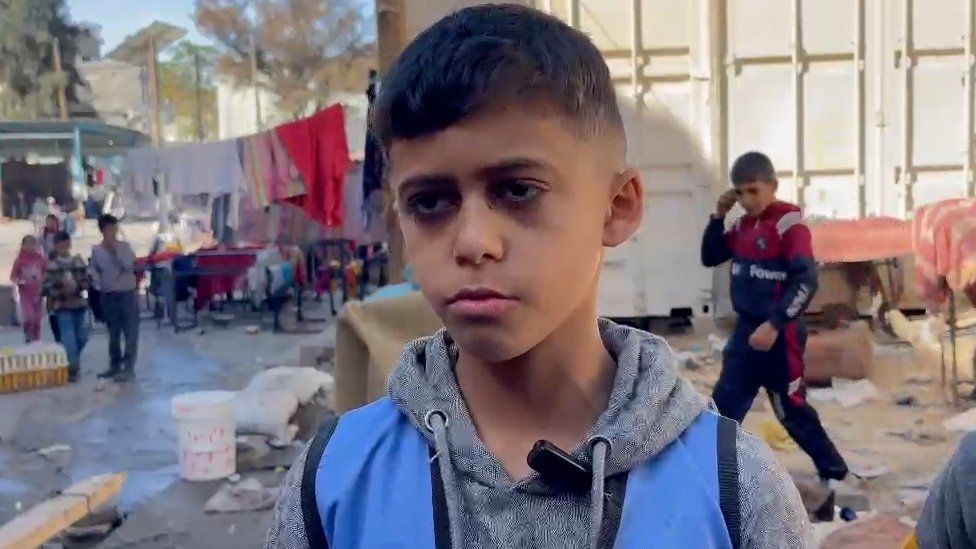Biden is being blackmailed that's why he is doing Israel's bidding, Zions have him by the balls :-
As the war on Gaza sparks unprecedented anger, why is the US president’s support for Israel so unshakeable?

www.aljazeera.com
BREAKING
At least 26,751 killed and 65,636 wounded in Israeli attacks on Gaza since Oct 7Israelis storm Al-Amal Hospital, order doctors and displaced people to leaveWorld Health Organization chief raises alarm over 'severe hunger' in Gaza
Click to pause breaking news tickerClose Breaking News Ticker
'Defies logic'
The makings of Joe Biden's 'blank cheque' to Israel
Smoke billows over Rafah in the southern Gaza Strip during Israeli bombardment on January 29, 2024 [AFP]
By
Jillian Kestler-D'Amours and
Joseph Stepansky
Published On 30 Jan 202430 Jan 2024
This is the first instalment of a two-part series delving into the origins of President Joe Biden's stance on Israel. For part two, click here.
Washington, DC – In retrospect, it may have been one of Joe Biden’s most career-defining moments.
Stern-faced and with outstretched arms, the then-Democratic senator
paced from left to right as he delivered an impassioned plea to his colleagues in the United States Congress. His message? Stop apologising for your support of Israel.
“There’s no apology to be made. None,” he said, pausing for dramatic effect.
“Were there not an Israel, the United States of America would have to invent an Israel to protect her interest in the region. The United States would have to go out and invent an Israel.”
It was June 1986: Biden, only 43, was decades away from becoming president. But in the years since, his words have taken on near-mythic significance – repeatedly touted by Biden himself as a symbol of his pro-Israel bona fides.
Today, Biden remains – in his words – “unwavering” in his
support for Israel, despite anger over its deadly military campaign in the Gaza Strip.
Some observers see his present-day stance as the product of decades spent building a reputation as one of Israel's foremost champions in Washington, DC.
Biden delivers remarks last December in Washington, DC [Evan Vucci/AP]
That support, however, could prove to be a political liability.
The war in Gaza has elicited fears of genocide as Israel bombards the Palestinian territory and limits access to food and water. More than 26,600 Palestinians have been killed in Israeli attacks.
But Biden’s administration has blocked
ceasefire resolutions at the United Nations and even bypassed Congress to increase weapons sales to Israel – pushing many experts to say he is leading one of the most staunchly pro-Israel administrations in US history.
“It’s self-destructive. It is not in the United States’s interests to be supporting a criminal,
genocidal attack on Gaza. It is not in the Biden administration’s political interests to be supporting the war on Gaza,” said Raed Jarrar, advocacy director at Democracy for the Arab World Now (DAWN), a think tank in Washington, DC.
“But President Biden has insisted against all odds and all advice ... to continue the flow of arms and unconditional political support for Israel.”
So why is the administration’s support for Israel so unshakeable? Al Jazeera spoke to more than a dozen foreign policy experts, rights advocates and former US officials about the factors that underpin
Washington’s position.
In this first instalment of a two-part series, we examine Biden’s personal and professional connections to Israel, forged over decades, and what his support for Israel amid the war in Gaza means for his political future.
In part two, we look at how history, domestic politics and foreign policy strategies influence the Biden administration’s stance.
Bonds forged over the dinner table
Then-Vice President Joe Biden gestures during his speech at Tel Aviv University in 2010 [Ronen Zvulun/Reuters]
“It starts with Biden himself and his personal beliefs,” said Josh Ruebner, an adjunct lecturer at Georgetown University.
Ruebner – who authored the book Shattered Hopes: Obama’s Failure to Broker Israeli-Palestinian Peace – believes Biden’s public affinity for Israel is sincere. “I don’t think it’s a political gimmick or a political act with him. I think it’s something he deeply and fundamentally believes in his bones.”
Biden himself has admitted as much. “It’s personal for me,” he said in a speech in 2015.
Indeed, Biden has woven his attachment to Israel into his origin story.
Born to a Catholic family in the mining town of Scranton, Pennsylvania, Biden has
recounted on multiple occasions how his father educated him and his siblings about the Holocaust over the dinner table.
Biden looks at pictures of Jews killed in the Holocaust during a visit to the Yad Vashem Holocaust History Museum in Jerusalem in 2010 [Ronen Zvulun/Reuters]
“My dad taught us about the horror of the Shoah,” Biden
explained last month at a Hanukkah celebration, repeating a well-worn tale. “It awakened in me and my brothers and sisters and our children a sense ... that this can happen again.”
On other occasions, Biden said his father – a “righteous Christian” – instilled in him the importance of Israel as a bulwark against threats to the Jewish people.
“He could not understand why there was a debate among Americans, or why there was a debate among American Jews, about whether or not we should have recognised Israel,” Biden said in the 2015 speech.
Those lessons would stay with him throughout his
political career. As a young adult, Biden transitioned from being a lawyer to being a rising star in Delaware politics.
He quickly emerged as the surprise winner in the state’s 1972 race for the US Senate. He was only 29 years old at the time. The Senate seat would be his for the next 36 years.
Israeli ties define formative years as senator
The US Capitol Dome is reflected in a rain puddle in September 2023 [J David Ake/AP]
It was during his time in Congress that Biden forged his deep bonds with prominent Israeli leaders, including longtime politician and now-Prime Minister
Benjamin Netanyahu.
He was only in his inaugural year as a senator when he met Golda Meir, the first female prime minister of Israel.
In an anecdote he has brought up frequently over the years, Biden recounts how, on a trip to the country shortly before the 1973 Yom Kippur War, Meir leaned over to tell him why she was confident in Israel’s longevity.
“She said, ‘Don’t worry, Senator Biden. We have a secret weapon here in Israel.’ My word, this is what she said: ‘We have no place else to go',” Biden said during a news conference on October 10, repeating the anecdote.
Amid the current
war in Gaza, Biden has used Meir’s words as part of his rationale for backing Israel, describing its existence as essential for Jewish safety.
“For 75 years, Israel has stood as the ultimate guarantor of security of Jewish people around the world so that the atrocities of the past could never happen again,” he said in the same October speech.
“And let there be no doubt: The United States has Israel’s back.”
'Everybody knows I love Israel'
Israeli soldiers operate in the Gaza Strip, in this handout picture released on January 29 [Israeli army/Handout via Reuters]
While apparently sincere, Biden’s personal affinity for Israel has served a political purpose, too.
Biden has repeatedly touted his pro-Israel credentials over the years, even calling himself a “Zionist in my heart” at a 1999 hearing for the Senate Committee on Foreign Relations (
PDF).
But never were his ties to Israel more politically important than when Biden became vice president to Barack Obama.
At the time, US media and pro-Israel lobby groups were painting Obama as the toughest Israel critic to ever step into the Oval Office. Reports of “frosty” relations between Obama and Netanyahu frequently made headlines.
“I hate to present it as good cop-bad cop,” said Ruebner, the Georgetown lecturer, noting that Obama ultimately provided
unprecedented levels of military support for Israel. But “Biden was often sent as the good cop and to smooth things over”.
Biden, top left, looks on as Israel's Netanyahu addresses a joint meeting of the US Congress in 2011 [Alex Wong/Getty Images]
Biden’s role, he added, was to be “someone who could talk at that emotional, empathetic level of identification with Israel”.
And that’s the part he played. In 2015, as Obama’s vice president, Biden
marked Israeli Independence Day by declaring: “My name is Joe Biden, and everybody knows I love Israel.”
His pronouncement came despite Israel regularly putting a spoke in the wheel of the Obama administration’s Middle East efforts. Netanyahu was
staunchly opposed to an Iran nuclear deal, a top priority for Obama.
He also stymied US efforts to jumpstart stalled peace negotiations with the Palestinians, going as far as to unveil plans for Israeli settlement expansion in the occupied West Bank while Biden was visiting in 2010.
But “even that slap in the face” was not enough “to really detract Biden from his own personal rapport with Netanyahu and his personal identification with Israel”, Ruebner told Al Jazeera.
Lack of critical voices, debate
Demonstrators rally in the US capital for the March on Washington for Gaza on January 13 [Jose Luis Magana/AP]
Elected president in 2020, Biden has continued to play the role he honed under the Obama administration: steadfast ally to Israel.
Some critics have termed Biden’s approach “bear-hug diplomacy”, in reference to the warm embrace he gave Netanyahu soon after the war in Gaza erupted in October.
But the outcry over that approach has mounted as the death toll in Gaza has grown amid relentless Israeli bombardment.
Critics have called on Biden to
push Israel for a ceasefire – or premise US aid on human rights protections. So far, he has done neither.
“This administration’s policy [has been] absolutely abominable, devoid of any rationale, devoid of human compassion,” said Huwaida Arraf, a Palestinian-American activist and civil rights lawyer.
Video Duration 01 minutes 37 seconds01:37
Biden visits Israel and reaffirms support for war in Gaza
“It’s one thing to say you sympathise with Israel but to take that to the level of what [Biden is] doing now, which is enabling a genocide and not showing concern for Palestinian life at all, is beyond not only what we would expect from a world leader, a national leader, but also a decent human being,” she told Al Jazeera.
The policy, she added, “defies logic”.
Shibley Telhami, a professor at the University of Maryland and director of the Critical Issues poll, said it is clear that Biden “has made up his mind, and everybody in the administration is going along with it”.
Telhami, who previously served as an adviser to US officials, told Al Jazeera that, in his interactions with Biden over the years, it was clear that the now-president was always “very confident” in his own knowledge and opinions.
“While he will listen, it’s not clear that he hears,” Telhami said. “There’s a little bit of give and take, but in the end, it settles down on: ‘He knows best.'”
That approach, Telhami explained, “puts a wall around him, not to hear the voices of dissent, or to dismiss them, because he already has made up his mind. And he does that in the name of leadership.”
Then-Vice President Biden waves upon his arrival at Ben Gurion International Airport near Tel Aviv in 2010 [Baz Ratner/Reuters]
A former US official also told Al Jazeera that “the absence of debate” is a critical piece of the puzzle.
The ex-official, who asked to remain anonymous to speak freely, explained that before the start of
the war on October 7, there was space to raise concerns – but they never got very far.
The general view was that criticising Israel within the administration was “career suicide” and, as a result, many staffers engaged in “self-censorship”.
The former official also drew a contrast between how Biden and Obama set up their cabinets: Obama brought in people with opposing views, while Biden recruited colleagues he had worked with for many years.
“The people around Biden are not giving him a broad variety of perspectives,” the ex-official said. “When you don't have debate, when you don't have other voices heard, you don't have good policy.”
Israeli-Arab normalisation an end goal
Biden, right, holds a meeting with Israeli Prime Minister Benjamin Netanyahu on the sidelines of the 78th UN General Assembly in September 2023 [Kevin Lamarque/Reuters]
Recent US media reports have highlighted one lesser-known official who does, however, have the president’s ear: Brett McGurk, the White House coordinator for the Middle East and North Africa.
A longtime diplomat, he previously served as a special assistant to Republican President George W Bush, focusing on policy and strategic planning in Iraq and Afghanistan. McGurk also became Obama’s special envoy in the global coalition to counter ISIL (ISIS).
A
report in the HuffPost last month described McGurk as controlling which voices can weigh in on the White House’s decisions about Gaza.
“The State Department essentially has no juice on [Israel-Palestine] because Brett is at the centre of it,” an unnamed US official told the news outlet.
The HuffPost also
reported on January 12 that McGurk is pushing a post-war plan that prioritises the normalisation of diplomatic relations between Israel and Saudi Arabia, something likely to spark ire among Palestinians.
Jake Sullivan, Biden’s national security adviser, also said
the “normalisation” initiative will remain a key component of the administration’s policies when the war ends.
Play Video
Video Duration 05 minutes 15 seconds05:15
Antony Blinken is translating Israel genocide into strategic breakthrough: Marwan Bishara
“When President Biden and Prime Minister Netanyahu spoke in the weeks and months leading up to October 7, this was a key topic of discussion: Where do the Palestinians fit into a broad vision for Israel’s integration into the region and normalisation with Arab states?” Sullivan
said during this month’s World Economic Forum.
The White House did not respond to Al Jazeera’s multiple requests for comment on the administration’s policies.
However, Imad Harb, the director of research and analysis at the Arab Center Washington DC, a think tank, slammed the
Biden administration’s approach.
“It’s like they haven’t learned anything over the last 100 days,” he told Al Jazeera. “They’re still talking about, ‘How can we accommodate Israel’s grand design of being friendly with the Arab world?’ You can’t be friendly with the Arab world any more if you are still killing Palestinians.”
Harb added that, while US presidents often make their own policy decisions, the advice they seek is critical. “The most effective administrations usually are those that listen to two sides of the coin. This one does not seem to be listening to other opinions.”
Political costs to Biden’s wartime stance
Posters of Biden and plastic dolls are placed next to a fence near the White House during the March on Washington for Gaza in January [Anna Rose Layden/Reuters]
Biden’s Gaza policy could have serious ramifications as he
seeks reelection this November.
Jaylani Hussein is among
many Muslim Americans who cannot envision a scenario in which they would cast another vote for the Democrat.
Hussein is a national committee member for AbandonBiden, a campaign to encourage Muslim community members to ditch the president over his stance on Gaza. He said many voters who supported Biden in 2020 feel betrayed by his decision not to call for a Gaza ceasefire.
“We elected him and we fought really hard,” Hussein told Al Jazeera. “We’re not asking him to resolve the Israeli-Palestinian issue. We’re just asking him to say the most basic thing, which is: Palestinian families shouldn’t be wiped out with American weapons.”
The 2024 presidential race is shaping up to be a rematch of the 2020 election, where Biden edged out former Republican
President Donald Trump.
Play Video
Video Duration 02 minutes 09 seconds02:09
Biden’s election-year Gaza problem
But November’s election is set to be tight. Surveys late last year showed Trump leading Biden in key swing states including Arizona, Georgia and Michigan. Experts warn Biden’s support for Israel could prove to be a decisive factor in his reelection efforts.
A
recent poll from The New York Times and Siena College showed 57 percent of Americans disapproved of Biden’s handling of the Palestinian-Israeli conflict. But that disapproval figure jumped to 72 percent among voters under age 30 – a key Democratic Party demographic.
“The Biden administration and the Democratic Party itself, they’re under-estimating how valuable and how important the Palestinian cause is,” said Laura Albast, an editor with the Institute for Palestine Studies-USA.
“They think that foreign policy doesn’t matter, and that people are just going to vote based on economic need, based on whatever other promises that are [made],” she explained. “But they’re underestimating how committed free people are to the freedom of the Palestinians.”
Telhami, the University of Maryland professor, said Biden likely believes that a “fear of Trump” might “suffice for him to win” again. Trump enacted a strict
immigration policy known as the “Muslim ban” and regularly uses racist and divisive rhetoric at his rallies.
But Telhami said, “I think he’s wrong.”
“He may have assumed early on, based on his experience from the 1980s and 1990s, that this posture [on Israel] could be also helpful to him politically, but it has proven to be not particularly helpful.”
Demonstrators hold up a bloody effigy of Biden during the March on Washington for Gaza in Washington, DC, on January 13 [Jose Luis Magana/AP]
Widespread anger keeps building. As a result of Biden's Gaza policy, two officials
publicly resigned, staff members wrote open letters in protest, and Arab-American leaders in Michigan
refused to meet with his campaign staff last week. Demonstrators continue to interrupt his campaign speeches with calls for a ceasefire.
Asked if he was concerned about losing the support of Arab-American voters over Gaza, Biden recently told reporters: “The former president [Trump] wants to put a ban on Arabs coming into the country. Let's make sure we understand who cares about the Arab population – number one. Number two, we've got a long way to go in terms of settling the situation in Gaza.”
But Arraf said that, if Biden believes Americans will vote for him because of a fear of Trump, he has gravely misread the situation.
“Certainly, we can’t say Trump is going to be any better, but that still is not going to convince people to pull the lever for the person who green-lighted and was complicit in and enabled a genocide,” she told Al Jazeera.
“What kind of person not only allows this to happen but actually enables this to happen? And what kind of person would I be, voting for the kind of person that enables these atrocities to happen?”
SOURCE: AL JAZEERA

















 www.facebook.com
www.facebook.com






















www.nytimes.com

www.huffingtonpost.co.uk
